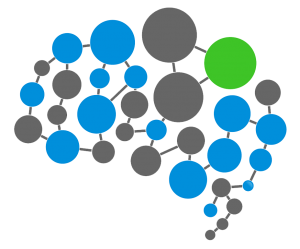
The FENS-Kavli Network of Excellence (FKNE) Mentoring Prize is awarded every second year and honors a scientist who has demonstrated leadership in fostering the careers of neuroscientists.
Personal prize money: 2.000 €
Eligibility:
The nomination must include:
Nominations Deadline: 1st March 2020 (midnight, Brussels time).
Note: The results of the submitted nominations will be communicated to the proposers and nominees on 23rd April. The recipient of the Mentoring Prize will be publicly announced at the FENS Forum 2020.
* The Selection Committee members are ineligible for nomination for the Mentoring Prize in the year(s) they sit on the Committee.
Awardees of the Mentoring and PhD Prizes 2018
Congratulations to the awardees!

Professor Fotini Stylianopoulou (University of Athens) has been awarded the FENS-Kavli Network of Excellence Mentoring Prize for her outstanding contributions in facilitating the careers of neuroscientists in Europe. FENS-Kavli Scholars recognise the essential of role mentoring in facilitating both careers of neuroscientists and also in scientific progress and founded this prize to recognise and promote outstanding mentoring. 30 nominations came in from across Europe, all demonstrating an inspiring commitment to mentoring. Prof. Stylianopoulou was nominated by current and former colleagues for going above and beyond in her efforts to teach and champion researchers, showing them that “the sky is the limit” and that “a true scientist never stops inquiring, combining information, seeing beyond the obvious and the dogma, but most importantly listening to what others have to say no matter if they are colleagues or undergraduate students.” Along with the stellar support of direct trainees, Prof Stylianopoulou has made an enormous difference to the European Neuroscience community. She was a pioneer of neuroscience research and teaching in Greece being one of the first people to teach neuroscience to graduate students in Greece and a founding member and former president of the Hellenic Society for Neurosicence. Prof. Stylianopoulou has also served as Secretary General of FENS, demonstrating her commitment to fostering neuroscience careers both in her own laboratory and throughout the world community.
 Dr. Arseny Finkelstein has been awarded the inaugural FENS-Kavli Network of Excellence PhD Thesis Prize. Dr. Finkelstein conducted his PhD project in the lab of Dr. Nachum Ulanovsky at the Weizmann Institute in Rehovot, Israel. With meticulous work, he discovered and quantitatively characterized 3D head direction cells in the freely moving bats using his own custom developed tracking device. This system can be considered a 3D compass in the brain. Dr. Finkelstein and colleagues published these results in Nature in 2015. Then, he went on to show that certain neurons of the bat hippocampus encode the directions and the proximity of spatial goals, potentially forming the basis of goal-directed navigation, which work resulted in a shared first author publication in Science. These results are groundbreaking, because navigation is traditionally studied only in two dimensions and extending it to the full space required the development of novel technology applied to an uncommon model organism. This convinced the jury to select Dr. Finkelstein as the winner of 54 entries, which were often also of outstanding quality. Dr. Finkelstein continues his work at Janelia Research Campus, HHMI, USA with Dr. Karel Svoboda.
Dr. Arseny Finkelstein has been awarded the inaugural FENS-Kavli Network of Excellence PhD Thesis Prize. Dr. Finkelstein conducted his PhD project in the lab of Dr. Nachum Ulanovsky at the Weizmann Institute in Rehovot, Israel. With meticulous work, he discovered and quantitatively characterized 3D head direction cells in the freely moving bats using his own custom developed tracking device. This system can be considered a 3D compass in the brain. Dr. Finkelstein and colleagues published these results in Nature in 2015. Then, he went on to show that certain neurons of the bat hippocampus encode the directions and the proximity of spatial goals, potentially forming the basis of goal-directed navigation, which work resulted in a shared first author publication in Science. These results are groundbreaking, because navigation is traditionally studied only in two dimensions and extending it to the full space required the development of novel technology applied to an uncommon model organism. This convinced the jury to select Dr. Finkelstein as the winner of 54 entries, which were often also of outstanding quality. Dr. Finkelstein continues his work at Janelia Research Campus, HHMI, USA with Dr. Karel Svoboda.
The prizes, which consist of a special plaque and €2,000 Euros each, have been awarded at the FENS Forum 2018 on the 9th July.
Mentoring Prize 2018 Selection Committee*:
PhD Prize 2018 Selection Committee*:
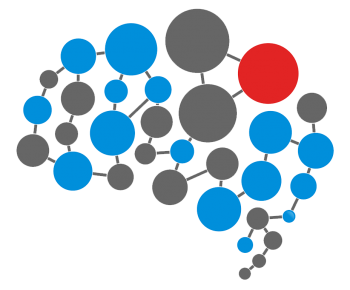
Current affiliation: Cold Spring Harbor, USA
Place where the PhD was conducted: Karolinska Institutet, Sweden
Current affiliation: MRC Laboratory of Molecular Biology, UK
Place where the PhD was conducted: University of Cambridge, UK
Current affiliation: Universität Würzburg, Germany
Place where the PhD was conducted: Lund University, Sweden
Current affiliation: Champalimaud Foundation, Portugal
Place where the PhD was conducted: Humboldt Universität zu Berlin, Germany
Current affiliation: University College London, UK
Place where the PhD was conducted: University Bonn/German Center for Neurodegenerative Diseases Bonn, Germany
Current affiliation: University of Oxford, UK
Place where the PhD was conducted: University of Oxford, UK
Current affiliation: Leibniz Institute for Molecular Pharmacology (FMP)/NeuroCure Cluster of Excellence, Germany
Place where the PhD was conducted: Leibniz Institute for Molecular Pharmacology (FMP)/NeuroCure Cluster of Excellence Berlin, Germany
Current affiliation: Ludwig-Maximilians-University Münich, Germany
Place where the PhD was conducted: Université de Genève, Switzerland
Current affiliation: Stanford University, USA
Place where the PhD was conducted: KU Leuven, Belgium
Current affiliation: Beth Israel Deaconess Medical Center, Harvard Medical School, USA
Place where the PhD was conducted: Champalimaud Centre for the Unknown Lisbon, Portugal
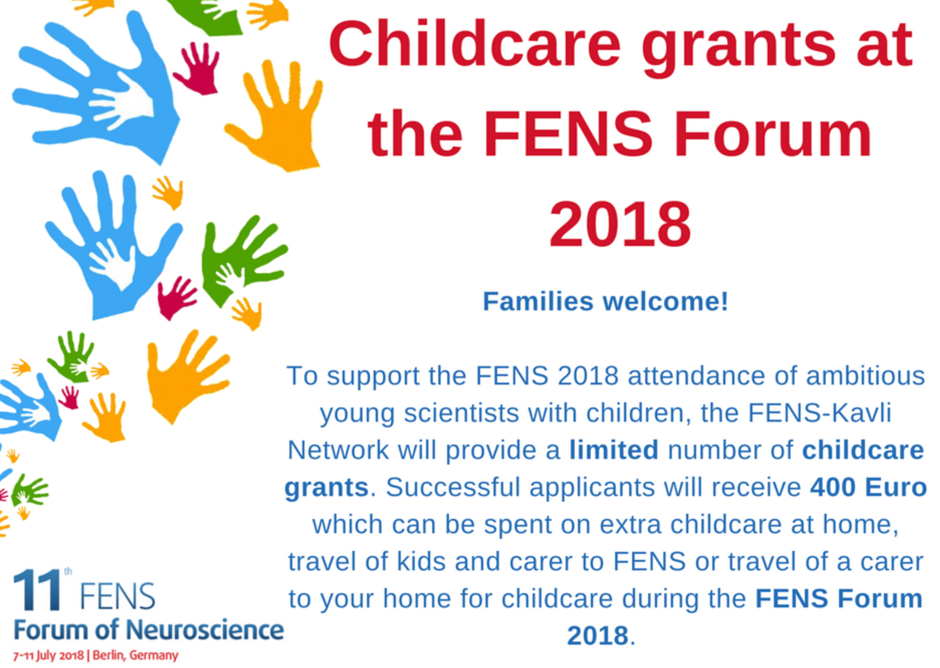
Following the call for applications for childcare grants at FENS Forum 2018, support fo 29 young parent scientists from 15 countries was made possible by generous funding from:
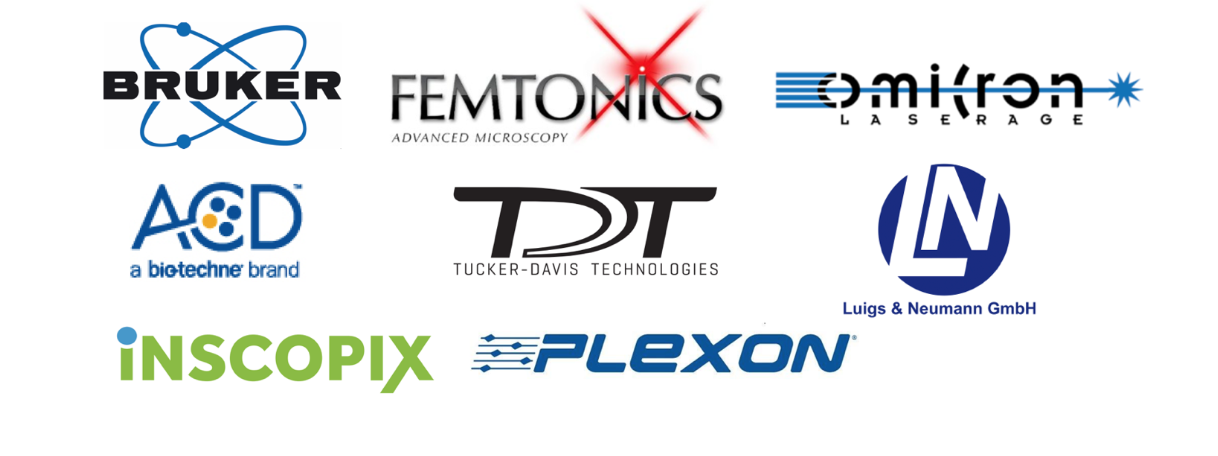
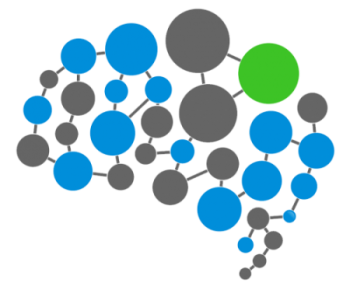 FENS-Kavli Network of Excellence
FENS-Kavli Network of ExcellenceThe FENS-Kavli Scholars aim to promote neuroscience and support early-career neuroscientists in Europe. We recognize that mentoring plays an essential role in fostering scientists, but mentoring efforts are often not recognized or rewarded in a scientific career. This award will honor an individual who has demonstrated leadership in fostering the careers of neuroscientists.
Commitment to mentoring may be demonstrated for example by:
Eligibility:
The nomination must include:
Nominations Deadline: 1 March 2018 (midnight, Brussels time).
Note: The results of the submitted nominations will be communicated to the proposers and nominees on 23 April. The recipient of the Mentoring Prize will be publicly announced at the FENS Forum 2018.
Mentoring Prize Selection Committee *:
* The Selection Committee members are ineligible for nomination for the Mentoring Prize in the year(s) they sit on the Committee.
For enquiries, please contact: excellence_network@fens.org
The FENS-Kavli Network of Excellence PhD Thesis Prize is awarded every second year and honors a young neuroscientist for his/her outstanding PhD thesis in any domain of neuroscience.
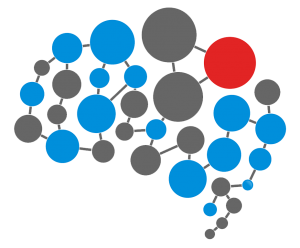
Eligibility:
Call Deadline: 1 March 2018 (midnight, Brussels time).
PhD Thesis Prize Selection Committee *:
* Should candidates be applying from the same lab than a member of the PhD.Thesis Prize Selection Committee, this member will automatically be excluded from the final assessment.
For enquiries, please contact: excellence_network@fens.org
Awardees of the Mentoring and Ph.D. Prizes 2016
Congratulations to the awardees!
> Download here the Press release

Prof. David Attwell, Fellow of the Royal Society (University College London) has been awarded the inaugural FENS-Kavli Network of Excellence Mentoring Prize in 2016 for his outstanding contributions to mentoring the careers of neuroscientists. This prize was funded because FENS-Kavli Scholars recognize that mentoring plays an essential role in fostering the career development, but mentoring efforts are often not recognized or rewarded in a scientific career. Close to 30 nominations were submitted from across Europe. Professor Attwell, Jodrell Professor of Physiology at University College London (UCL), was nominated by current and former mentees who praised his strong support throughout their careers. His students and postdocs are personally trained in all aspects of scientific rigour and thought, they are encouraged to present their work at excellent conferences, and are guided in writing papers, theses, and grant applications. Prof. Attwell aids trainees in planning their career progression and provides personal, as well as professional, support. The many letters of support for the nomination also cited Prof. Attwell’s strong mentoring of scientists through the difficult transition into juggling parenthood and a scientific career. Along with supporting his direct trainees, Prof. Attwell has started a world class PhD programme in neuroscience at UCL, which improves the choice of PhD project and mentor for students by integrating lab rotations. This is the most competitive neuroscience PhD programme in the UK with high level of success for students. Prof. Attwell also participates in public engagements and hosts school children in his lab.
 Dr. Linda Katona (University of Oxford) has been awarded the inaugural FENS Kavli Network of Excellence PhD Thesis Prize. The thesis published by Dr. Katona – originally from Romania, who graduated from the Department of Pharmacology at the University of Oxford – is a masterpiece for its depth, the originality of the experimental approach employed, as well as for the new insights obtained by her results. During her thesis conducted under the joint supervision of Professors Peter Somogyi (University of Oxford) and Thomas Klausberger (University of Vienna), Dr. Katona physiologically and molecularly characterized in depth the role of different types of GABAergic interneurons in the hippocampus of freely moving rats during distinct oscillatory states. Her results have not only been obtained with state-of-the-art techniques, but will also help to better understand rhythmic network functions during memory processing. Her work led to several publications in top neuroscientific journals and culminated with a first author paper in Neuron. On top of that, Dr. Katona’s thesis is excellently structured, flawlessly written and well illustrated, and convinced the jury to select her as the winner of over 45 other entries, which were often also of outstanding quality. Dr. Katona is currently a postdoctoral fellow at the University of Oxford and continuous to delve into the mysteries of brain rhythmicity underlying different memory systems.
Dr. Linda Katona (University of Oxford) has been awarded the inaugural FENS Kavli Network of Excellence PhD Thesis Prize. The thesis published by Dr. Katona – originally from Romania, who graduated from the Department of Pharmacology at the University of Oxford – is a masterpiece for its depth, the originality of the experimental approach employed, as well as for the new insights obtained by her results. During her thesis conducted under the joint supervision of Professors Peter Somogyi (University of Oxford) and Thomas Klausberger (University of Vienna), Dr. Katona physiologically and molecularly characterized in depth the role of different types of GABAergic interneurons in the hippocampus of freely moving rats during distinct oscillatory states. Her results have not only been obtained with state-of-the-art techniques, but will also help to better understand rhythmic network functions during memory processing. Her work led to several publications in top neuroscientific journals and culminated with a first author paper in Neuron. On top of that, Dr. Katona’s thesis is excellently structured, flawlessly written and well illustrated, and convinced the jury to select her as the winner of over 45 other entries, which were often also of outstanding quality. Dr. Katona is currently a postdoctoral fellow at the University of Oxford and continuous to delve into the mysteries of brain rhythmicity underlying different memory systems.
The prizes, which consist of a special plaque and €2,000 Euros each, were awarded at the FENS Forum 2016 on the 4th July.
Mentoring Prize 2016 Selection Committee*:
PhD Prize 2016 Selection Committee*:
